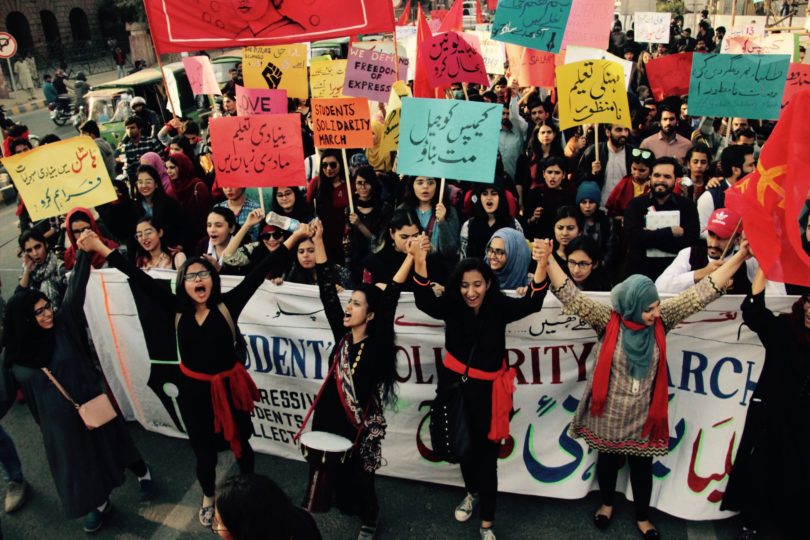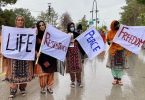By Zahid Ali & Sher Ali Khan
This article was written some months ago on the brutal killing of Mashal Khan, we are publishing it for our readers with courtesy to Jamhoor.
Many crocodile tears were shed after the brutal lynching of Mashal Khan, over false allegations of blasphemy, on April 13th, 2017 at the Abdul Wali Khan University in Mardan, Pakistan. But behind hollow promises of justice from the authorities, those accused of the lynching were garlanded with rose petals, while the few allies Mashal had lived in fear. Mashal became just another person struggling for his rights – one of many silenced by an array of powers beyond their control.
Mashal, in his death, is a figure whose life and afterlife will continue to haunt the administrative apparatus of the Pakistani state. On the one level, he represents a threat to the dominant narrative of the security state, where students are seen as nothing more than a security problem and a consumer base through which profits can be earned. On a different level, Mashal is viewed as an inspiration for the unfinished resistance against creeping fascism on campuses and the wider neo-liberalization of the education system in Pakistan.
To mark the first anniversary of his lynching in 2018, the Left theatre group, Azaad Fankar, held a dramatic re-enactment of the event for a crowd of students and activists. The idea was to resurrect the spectacle of one student having the audacity to speak truth to power. They raised the resonating slogan, “Mein Bhi Mashal Hoon” (I, too, am Mashal). The students paying their respects carried paintings and posters of Mashal alongside banners which read, “Right to a Safe Campus”, “Stop Harassing Professors and Students”, and “Killed on Campus, Justice for Mashal”. To quote his teacher, Ziaullah Hamdard who has been living under immense threats to his own life, “Mashal can only be represented through honest struggle against injustice because his life was dedicated to fighting for the basic rights of others.”
The process of consolidating state power in Pakistan and dismantling genuine spaces of public representation, including the university and the factory, was driven in the late 1970s by the Islamist dictatorship of General Zia ul Haq, who came to power via a military coup. The Zia regime saw students as potential threats. Zia had passed strict orders to prevent potential collaboration between student bodies, journalists’ unions and trade unions, of the kind that organised resistance alongside left-wing parties to topple the dictatorship of Ayub Khan in the 60s. Democratically elected Left student groups were violently removed from campuses through a policy of funding and supporting Islamist groups. Deeply conservative and right-wing student groups, such as the Islami Jamiat-e-Talba and Pashtun Students Federation (PSF) were given free run on campus. This sparked fierce clashes between students, in turn providing the state with an excuse to ban student unions altogether.
The late 1970s was a period of increasing authoritarianism in Pakistan. The military dictatorship of General Zia, with its unchecked power, Islamized every aspect of Pakistani society. As such, the site of the Abdul Wali Khan University cannot be understood outside of the racism and brutality that accompanied the unprecedented and unaccountable exercise of power by the religious Right, including on campuses, under the support of an authoritarian state since the 70s.
The Abdul Wali Khan University became a site of negation for students like Mashal and his comrades, Zubair and Abdullah, who challenged the prevalent authoritarianism and conservative ideology on campus and were, in consequence, met with unprecedented mob violence under false allegations of blasphemy. In fact, two days before his lynching, Mashal had given an interview to a Pashto-language television channel, Khyber TV, where he criticised senior university administration for raising tuition fees, embezzling public funds, and massive financial corruption.
Alarmingly, as reported by the Joint Investigation Team constituted in the wake of the lynching, Mashal’s vocal stance against the university administration’s corruption was taken as threatening by the President of the PSF, Sabir Mayar. Sabir reportedly met his relative (and president of the university’s employees’ association) Ajmal Mayar, to discuss the possibility of getting Mashal expelled from the varsity. The report reveals that the two cobbled together an alliance of corrupt administrators and politically-backed students and teachers who came together to label Mashal and his comrades blasphemers, effectively condemning him to death.
The killing of Mashal is also important in terms of the wider crackdown on dissent across campuses in Pakistan, a rising phenomenon since the implementation of the new counterterror campaign – the National Action Plan – in 2014. Under the regime of former Chief of Army Staff, General Raheel Sharif (now heading the Islamic Military Alliance (IMA) in Saudi Arabia), a propaganda campaign was launched through a new and improved media-wing of the armed forces – the Inter-Services Public Relations (ISPR). The ISPR led a campaign to present the armed forces as de-facto sovereign, deploying the rhetoric of war against terrorism and issuing generous funding for patriotic films and songs. Anyone who resisted or questioned the narrative of the ISPR was labelled anti-Pakistan, anti-state, or anti-Islam. This was done alongside a notorious regime of repression – rampant abduction of activists, rights campaigners, and nationalists struggling for autonomy, political assassinations, and censorship of anything critical of the War on Terror or arbitrarily defined “national interests”.
In this context, the role of students has been central in the recent revival of a new and independent Left in Pakistan. An increasing number of students and young activists have lent their support to and joined major social movements, such as the Okara tenants’ movement in the heart of Punjab, the struggle against the eviction of slum settlements in Islamabad, and various movements for the release of political prisoners. The Pashtun Tahaffuz Movement (Movement for the Protection of Pashtuns) emerged early last year against rampant extra-judicial killings and abductions of Pashtuns by state authorities and the regressive laws and policies that marginalise the (primarily Pashtun) population of Pakistan’s Federally Administered Tribal Areas (FATA). The movement is led by Manzoor Pashteen, a 26-year-old graduate of Gomal University in Dera Ismail Khan, and driven by mostly young Pashtun activists and students. This push is backed by the simultaneous growth of student, feminist, activist and art collectives across the country, which are being seen as incubators for a new independent Left.

Students Solidarity March (Lahore, Dec 2018) demanding tuition freeze, restoration of students’ unions and safe campuses.
It is thus that the university can be seen as a microcosm of society. Mashal is part of a generation that doesn’t see a future for itself in the neoliberal structure of the state. This is a structure which over several decades has made the promise of jobs or a life of dignity a far-fetched dream for the vast majority of university graduates. The university becomes a site that produces docile subjects, whose precarious existence comes to be controlled through centralized bureaucracies and pocket student unions, backed by establishment directives. It was a call for the university to provide better facilities and bring an end to rising tuition fees for working-class students that ruffled the wrong people at Mashal’s university. He had warned that the prevailing conditions would further marginalize students and may force them to look towards religious extremism and terrorism. He also represented a growing consciousness – built around opposition to the War on Terror, anti-imperialism, anti-religious extremism, and commitment to ideas of non-violence and humanism as an alternative line of politics.
Mashal Khan and many like him tried to challenge and expose the crisis of representation within the education system. As such, Mashal became a threat to the corrupt university administration and reactionary forces within the student body, which saw him as a threat to their hegemony and exploitation. Mashal exposed the underlying anxieties of the ruling elites – that allowing rights and representation for marginalised groups (students, women, workers, peasants, oppressed nationalities) may open the door to a wider emancipatory politics and calls for greater redistribution.
In the absence of platforms for student representation within the university, Mashal had raised his voice through social media. It was through the same social media platforms that the video of his brutal lynching would later be circulated. The videos proved to be important for illuminating key aspects of the case. One of the videos, shot on a cell phone, showed Arif Khan, local councillor of the Pakistan Tehreek-e-Insaf party ruling the province, requesting the mob not to reveal the identity of the person who had shot Mashal. Another showed Malang Jan of the Pashtun nationalist Awami National Party (affiliated with the PSF) thumping his chest gloatingly after the murder. Ironically, otherwise bitter political rivals, members of the PTI joined with others from the secular-liberal ANP and religious Jamaat-e-Islami and Jamiat Ulema-e Islam (Fazal) to hold meetings and rallies in hopes of saving the murderers.
Social media allowed the videos and images of the attack on Mashal to circumvent the confines of the university, where critical space for students is shrinking. At the root of this phenomenon is the neo-liberalisation of universities, through which students are increasingly viewed not as human beings, situated in a certain class or within a framework of rights or identity, but rather as potential threats or mere sources of income. Thousands of students from the tribal areas of Pakistan have spent their childhood in the shadows of tanks, machine guns, and drone attacks, which have destroyed the already scant infrastructure in those areas. Many have been compelled by the War on Terror to migrate towards metropolitans for higher education. In the absence of any autonomy, representation, or decision-making powers, university administrations and the state see these students as potential threats whenever they demand their rights. It is this crisis of representation, for students in general and migrant students in particular, of which Mashal has become a symbol.
In this post-Mashal period, the struggle for representation is increasingly taking on the paradigmatic form of political conflict. The latest demands for representation exacerbate the struggles of groups mobilized under the banners of ethnicity, nationality, gender, and sexuality. Under the neoliberal security state of Pakistan, group identity is becoming the popular form of political mobilization. There is a growing sentiment among all minority nationalities of being exploited by the state and robbed of their identities through a system of state-enforced terrorism and cultural domination. Large numbers of women, female students, in particular, are mobilising on issues of sexual harassment and gender-based violence. However, these struggles for representation are occurring in the backdrop of increasing material inequality.
Within a year after Mashal’s death, students across campuses in Pakistan – University of Engineering and Technology Taxila, Quaid-i-Azam University Islamabad, Government College University Faisalabad, University of the Punjab, and Government College University Lahore and others – have challenged and mobilised on rising tuition fees, better food and drinking water facilities, presence of extremist religious groups on campuses, and the issue of representation of various ethnic, religious, and gender groups in the education system. In doing so, they have declared their allegiance to the legacy of Mashal Khan. To use Avery Gordon’s provocative phrase, “endings that are not over”, they must keep raising the questions Mashal did in order to be faithful to his struggle and memory.
The societal pressures that made the lynching of Mashal Khan possible continue to exist and may well lead to another incident of barbarism in the future. Reflecting on the events of Auschwitz in 1967, the German philosopher Theodor Adorno published an essay titled Education after Auschwitz. He argued that we must recognise the importance of education as a stronghold against fascism. Education as a critical practice provides the means for disrupting the common-sense ideology propagated by mass media, the reactionary tendencies associated with hyper-masculinity, the traditions of everyday violence, the incapacity to identify with others, the continuous practice of state repression, and its fascination with empire.
If we want to show fidelity to Mashal’s cause, our response must be to promote educational practices that emphasize the potential of autonomous individuals. We must demand an education that raises questions to structures of power – in the form of universities or state structures – and produces among students the will to resist material and symbolic forces of domination. Only through serious engagement with the possibility of an emancipatory future can we attempt to stop the horrors of the past.
Courtesy Jamhoor







